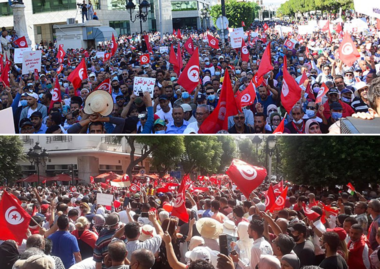| 2021 Tunisian self-coup | |||
|---|---|---|---|
| Part of Arab Winter | |||
 Above: an anti-coup demonstration, Tunis, 10 October 2021 Below: a pro−Saied demonstration, Tunis, 3 October 2021 | |||
| Date | 25 July 2021 | ||
| Location | |||
| Caused by |
| ||
| Resulted in | Coup successful
| ||
| Parties | |||
| Lead figures | |||
Kais Saied Rached Ghannouchi | |||
The 2021 Tunisian self-coup took place on 25 July 2021, when Tunisian President Kais Saied dismissed the government of Hichem Mechichi, suspended the Assembly of the Representatives of the People and revoked the immunity of its members. Described as a self-coup, the move came after a period of political instability marked by a series of protests against the Ennahda-backed government and the collapse of the Tunisian healthcare system amidst the COVID-19 pandemic in the country.
The day after the self-coup, Saied imposed a month-long curfew from 7 p.m. to 6 a.m. After the 30-day period expired, Saied extended the period of his measures "until further notice". In October, Najla Bouden was appointed to head a new government, making her the first female prime minister both in Tunisia and the Arab world. In July 2022, a new constitution expanding the president's powers was adopted after a referendum boycotted by over two-thirds of voters, paving the way for parliamentary elections in December 2022 and January 2023 which were also boycotted by a large sector of the population.